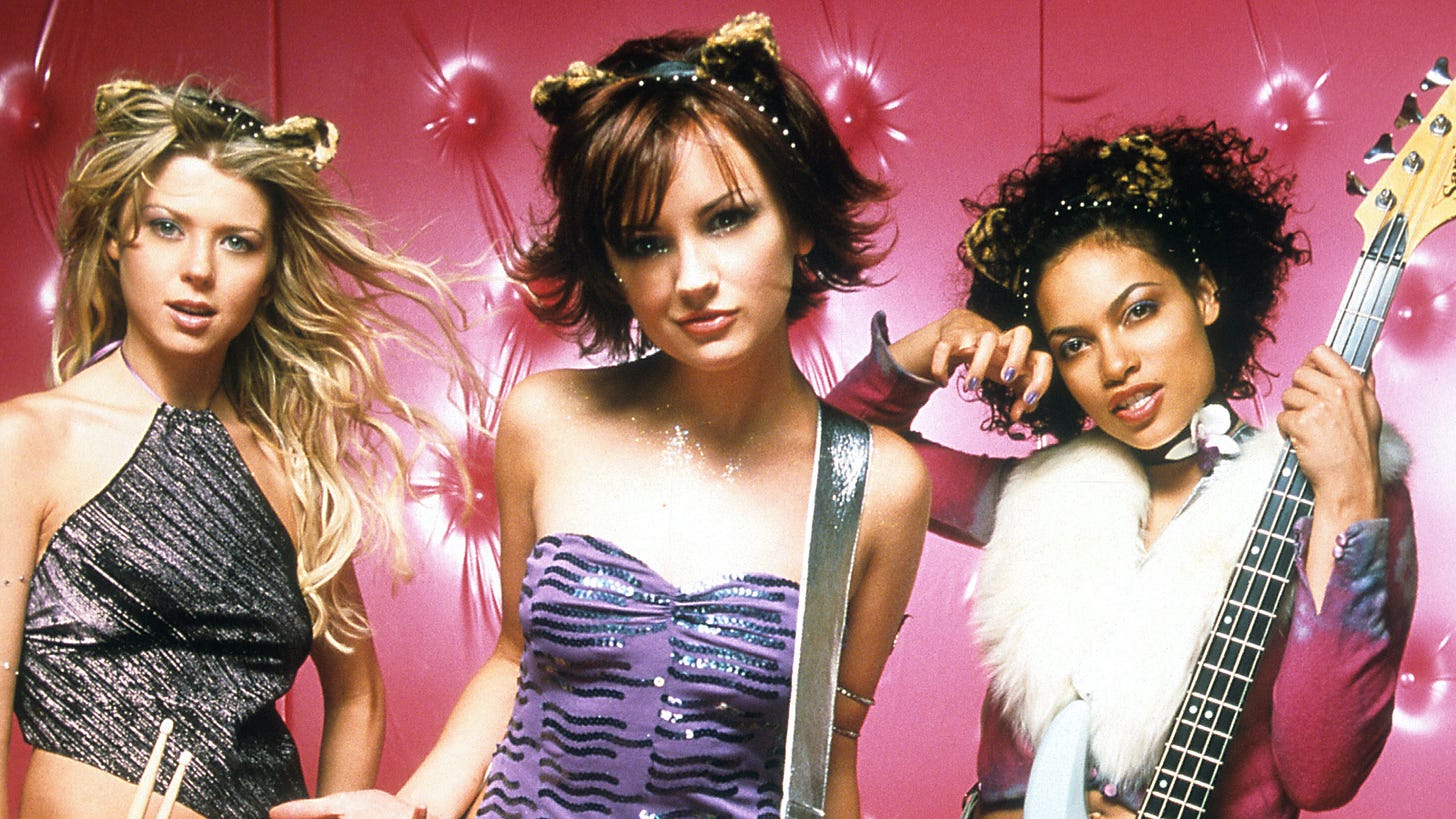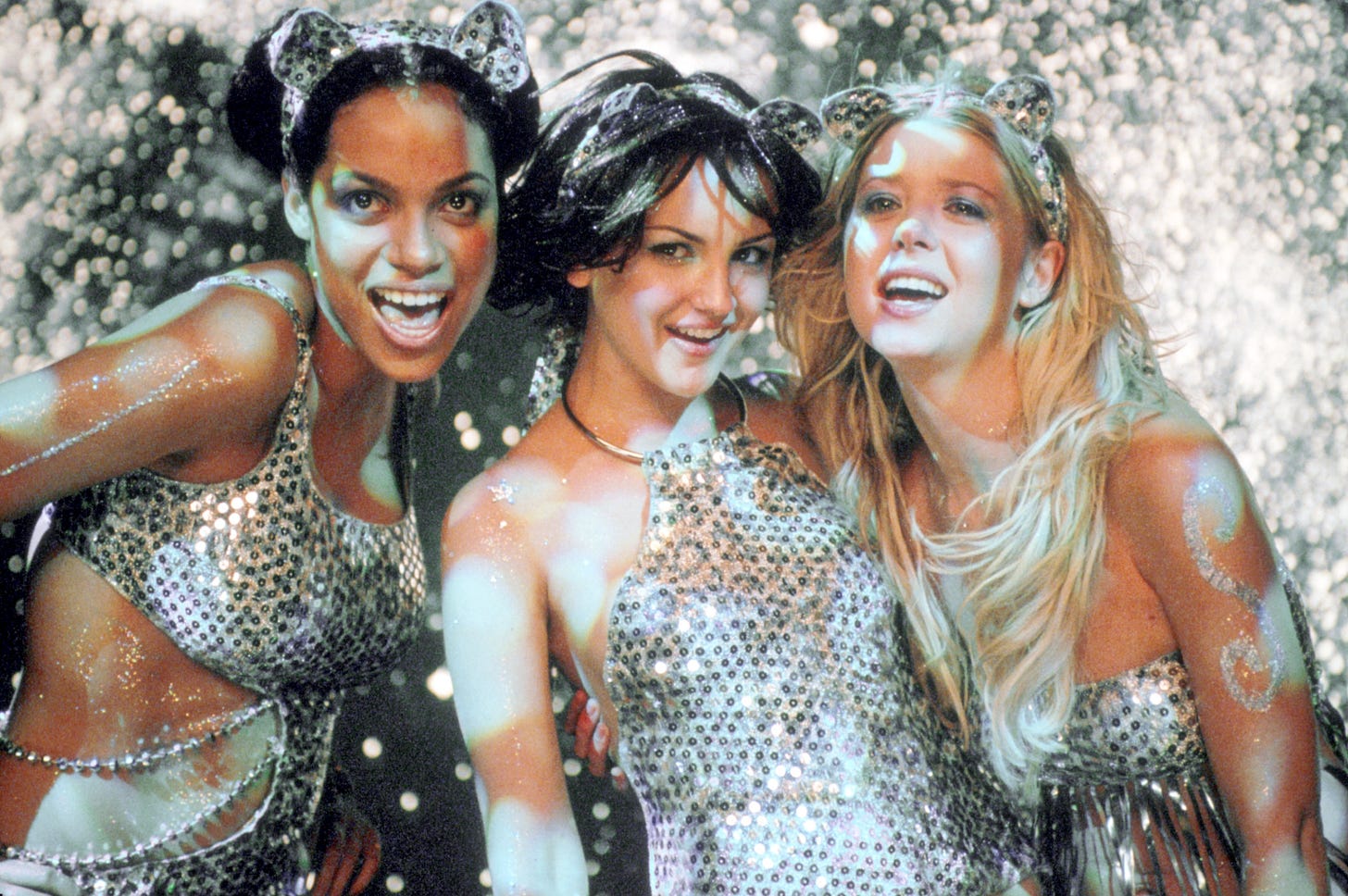We Don't Talk Enough About: The 'Josie and the Pussycats' Soundtrack
This banger of a soundtrack for a movie poking fun at military propaganda was no accident.

I’m a sucker for nostalgia, often fixating on pop culture from my past life to feel comfort in a dark time. Which is how I found myself scouring the internet for the Josie and the Pussycats motion picture soundtrack a few weeks ago.
Josie and the Pussycats stars Rachael Leigh Cook as the titular Josie, Rosario Dawson as bassist and right-hand woman Valerie, and Tara Reid as the innocent Melody. Loosely based on the band featured in the Archie comics, the film follows the band’s sudden rise to stardom, which turns out to be the center of a United States government conspiracy to brainwash teens into mindless consumerism through the magic of subliminal messaging, facilitated in part by Mega Records label executives Fiona (Parker Posey) and Wyatt (Alan Cumming).
The film came out in 2001, the spring before 9/11 (more on that later!) and was an instant flop. In retrospectives, filmmakers Deborah Kaplan and Harry Elfont said that critics and audiences just didn’t get it (also more on that later). But by the time I had gotten around to watching the film two years later (my parents were not “movie people”), all of my classmates had moved on.
I moved on soon, too, but the music of the movie stayed with me, dormant until I found myself itching to listen to the album in the decades after. Perhaps that was because it wasn’t a collection of popular turn-of-the-millennium tunes, but an actual written and recorded album as played by a band who were singing about intense emotions and (seemingly) living out my childhood dreams of becoming a rock star.
Back in 2017 — the most recent time I recall searching for it — I could only find the soundtrack on YouTube, uploaded by a kind defender of the arts in 2009, though completely out of order. But I started listening to the soundtrack again a few months ago, pleasantly surprised that it’s now on Spotify.
And yes, it still fucking slaps. From the self-confident “3 Small Words” to the pop ballad “You Don’t See Me,” to covers of Iggy Pop’s “Real Wild Child” and Barrett Strong’s “Money (That’s What I Want),” this entire album drips of ‘90s female-fronted pop rock. It’s not quite riot grrrl but not not pop punk, and still exudes the coolness and confidence of any band of that era. There are also two songs on the album by boy band DuJour — whom Wyatt replaces with Josie and the Pussycats as the Next Best Thing once its members (played by Breckin Meyer, Donald Faison, Seth Green, and Alexander Martin) begin to unravel the conspiracy — and even those are hits a la Backstreet Boys. The movie even opens with one of these songs, which is simply an ode to anal sex (“Backdoor Lover”)!
I cannot explain to you just how brilliant this album is, so I beg you to listen for yourself. Just watch this movie montage set to “Pretend to Be Nice,” the second song in the clip below. An absolute banger of a song AND scene! No notes!!
The star quality of the Josie and the Pussycats soundtrack was no accident. It wasn’t just that the album had the financial backing of Universal and all the Mega Record-esque talent that came with it, but that its creation — from casting the singing voice of Josie, to the lyrics and production, to the training it took for Dawson, Cook, and Reid to actually look like they were performing these songs in the movie (because they were) — was all intentional.
Take this lineup from this 2017 oral history from Fader, titled “The Best Fake Rock Band Ever,” commemorating the album’s first-ever pressing on vinyl (on purple leopard print!) 16 years after the film’s release. (Last year, InStyle also published a retrospective oral history for the film’s two-decade anniversary.) No emphasis, because otherwise I’d be emphasizing the entire paragraph:
…These songs were the product of an epic all-star collaboration between a handful of the best pop and indie rock songwriters of the ’80s and ’90s. Kay Hanley, lead singer of vibrant alt-rock group Letters to Cleo, voiced Josie during the musical scenes, Singin’ In The Rain-style. Legendary R&B producer Kenny “Babyface” Edmonds served as executive producer and worked on half the songs, with lots of input from writer/director duo Deborah Kaplan and Harry Elfont. Fountains Of Wayne’s Adam Schlesinger produced the other half, while The Go-Gos’ Jane Wiedlin, that dog.’s Anna Waronker, Jellyfish’s Jason Falkner, Gigolo Aunts's Dave Gibbs, and Adam Duritz of Counting Crows all contributed melodies and lyrics.
Perhaps it makes sense that a movie about a rock band would need a proper rock soundtrack. But I think it better helps to understand that the album was never meant to be just a movie soundtrack — it was propelling the entire film, and it needed the right charisma and chemistry.
Fader’s oral history has a lot of good context and easter eggs about how the album was made to emulate an “all-woman Blink-182.” Though I will let you read more of those details yourselves, there are a couple points of interest that I want to highlight.
The first regards the obvious irony of the star power of this album. Of course anyone invested in the success of the film would want to create a hit record, but it’s hard to ignore the parallels: here was a group hired by an entertainment industry giant to manufacture a girl group to promote a movie about the consequences of what happens when an entertainment industry giant manufactures a girl group to promote U.S. government propaganda. No, I’m not saying the album itself is U.S. government propaganda (though that would explain why it’s so damn good!!!). But my point has less to do with the soundtrack itself, and more about redeeming the movie it scores.
When Josie and the Pussycats came out in 2001, it bombed, hard. Serious Film Reviewers shat on it for being a film about women and for playing too fast and loose with the obvious product placement, and viewers were reasonably mad at watching themselves be portrayed as brainless cogs who purchase, wear, and listen to whatever the Entertainment Powers That Be tell them.
Looking back, the cast and producers said that the film was just too ahead of its time. From the Fader article:
HARRY ELFONT: […] It was a movie about these girls that was aimed at teenage girls, or younger. But at the same time we wanted to make a very dark satire about commercialism. So there was a disconnect between what we were doing thematically and the story we were telling. There was a certain point during the production where we looked at the dailies and I had that moment of panic like, Oh, fuck. We’re making a cult movie. I can see what’s happening. I had a flash of what we had on our hands, and that, by nature, it wasn't gonna be embraced by a lot of people immediately.
I think I get it. Take these two scenes, for example:
Sure, I can understand why audiences might bristle at being told that they’re easily manipulated. But living in a capitalist hellscape amid a pandemic and the fallout from the War on Terror, a movie that highlights the existence of military and consumerist propaganda in the entertainment industry resonates with me.
Unfortunately, I can’t find a clip of the scene that pulls it all into focus (**SPOILER ALERT**), so I’ll have to describe it to you: When the jig is up at the end of the film, and the Pussycats foil the government’s and Fiona’s plot to take over the youth of America, a character named Agent Kelley, the Main Fed in charge, pins it all on Wyatt and Fiona, feigning culpability when Fiona says he was in on it, much to Josie’s satisfaction. The government gets away with it, plain and simple. But before they’re carted off, Agent Kelley tells Wyatt and Fiona that they were going to get shut down anyway — the government had learned that subliminal messaging was more effective in movies. Then, text flashes across the screen read out loud by a booming voice, reading and saying: “Josie And The Pussycats is the Best Movie Ever!” Underneath that text, however, is the phrase “Join the Army.”
It’s a funny almost-throwaway bit, but christ, my jaw dropped after hearing that line when I rewatched the film a month or so ago. Because we all know what happened after that movie came out. There was 9/11, and then a war that was fueled by a lie that a lot of powerful people got away with, and then lots and lots of pro-military, pro-America, anti-Muslim and anti-Brown person bullshit, and all of that was set on display in American entertainment for people to consume and emulate. Hell, you couldn’t get through watching a throwaway episode of reality TV without being told how great the Army was and that you should consider joining it. (And this shit still happens.)
No, I don’t think Josie and the Pussycats and its accompanying soundtrack were “onto something,” nor was it taking any substantial stance on military propaganda, but still.

Perhaps the ultimate thing I can really say about the album is that it’s so damn good, I can’t make heads or tails of it. Is it a piece of entertainment that claims to buck the status quo by merely acknowledging it, with no intentions of challenging that status quo because it inherently benefits from it? Or is it a piece of entertainment that uses its role within the status quo as a Trojan Horse to tell listeners to challenge it? Does it mean anything that an entertainment industry giant such as Universal Studios manufactured an all-hits-no-skips album to critique the propaganda it otherwise promotes and uses to manufacture consent?
And I’m not exactly pulling these questions out of thin air, either. From the Fader piece, again:
DEB KAPLAN: I don’t think we were psychic, but we did see the way things were going. We came up on grunge music and individuality. And all of a sudden it all started to disappear so quickly, and it was like we were being force-fed something shiny and clean and sanitized. Josie was a reaction to that.
Sure, I would love to be able to land this blog on some grand conclusion like, “The entertainment industry is one giant ploy to advance American imperialism.” Which, it is. The Josie and the Pussycats soundtrack isn’t, to put it mildly, the first place I would tell you to look to see that critique reflected. Regardless, it’s still a surprisingly complex piece of work about our relationship to what we consume, and, just as importantly, it absolutely slaps. Tell your friends, Josie and The Pussycats is the best soundtrack ever!



i discovered the soundtrack long before i watched the movie, oddly enough. both are perfection
I think about this album and movie frequently! I actually owned the CD back in the day and my friends were obsessed with it. Did it potentially help move my politics away from ultra-conservative religious parents? It might have! Basically I could gush for hours but your post made me feel so vindicated in my love 😅